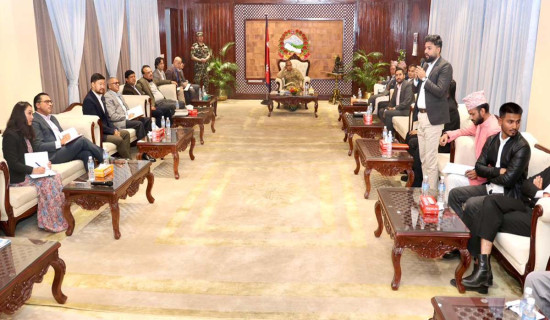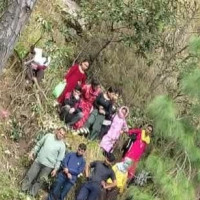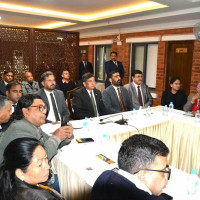- Thursday, 30 October 2025
Constitution And Constitutionalism
Today marks Constitution Day, observed annually on Aswin 3 of the Nepali calendar. It is the day on which the federal constitution of Nepal was promulgated, heralding a new era in the political and constitutional development of Nepal. The federal constitution commits, as mentioned in its preamble, to bring about transformation in the political, social, and economic development of the country. After the protracted Maoist conflict followed by a decade of constitution-making, the Constitution authored by the constituent assembly promises to usher in a more equal and inclusive society in which political power is devolved from the capital-centric centralised institutions to the far-flung remote areas of the country to secure that development is balanced across all regions of the country; religious and ethnic diversities are accommodated; and historically marginalised groups participate in governing the country .
Almost a decade following the proclamation of the constitution, some progress has certainly been made in implementing the federal agenda. The elections for all three levels of government have been held twice in 2017 and 2022, as a result of which new sub-national governments—provincial and local governments—are established and made functional, and their critical roles in public service provision are clearly recognised. Many laws effective during the pre-constitution period have been enacted or amended to align with constitutional provisions. Moreover, some policies and programmes that embody social justice and the fundamental rights of the citizens have been enacted.
Going through the provisions of the constitution, one can say that Nepal’s basic law is not just the document for the fundamental governance of the country; rather, it is a vehicle of the nation’s progress and prosperity. It is anticipated that the constitution would enable the Nepali society to cope with the needs of contemporary times and help acquire enough resilience to meet the challenges of the future. Likewise, as the constitution is a living document not for one or two generations but for generations to come, it should be amended to ensure that it meets the needs of the changed context and circumstances.
While the constitutional provisions related to federal political arrangements have been implemented, the post-conflict transitional justice process, which lingers as a critical yet unfulfilled constitutional concern, continues to languish for almost one and a half decades. However, it is positive to note that political parties have agreed to endorse the long-stalemated Truth and Reconciliation Act with unanimity to resolve the transitional justice-related issues. All eyes are now fixed as to how the commissions are reconstituted to take the pending transitional justice process forward. Further, as outlined above, the most important and noteworthy part of the constitution is its preamble in the sense that it is packed with promises in ensuring justice, social, economic, and political liberty, equality, and fraternity. However, the creation of an egalitarian social order remains unfulfilled wishful thinking. And no meaningful efforts have been made to this end. Not very long back, there was an initiation made to incorporate a provision in the proposed education act to convert the private schools into not-for-profit trusts, which could contribute to creating uniformity in the public education system. But the government backtracked on it in the face of the resistance shown by private school owners. The right to education enshrined in the constitution has not thus been taken due cognizance, which goes against the principle of the egalitarian values and ethos.
Constitutionalism in Nepal is led, influenced, and inspired by the democratic revolutions carried out from time to time over the years that reject the rule of inherited domineering elites, aristocracies, and absolute monarchies. The sovereignty and state authority of Nepal are vested in the Nepali people. All the Nepali people, with multiethnic, multilingual, multi-religious, and multicultural characteristics, have common aspirations, and they are united by a bond of allegiance to the national independence, territorial integrity, national interest, and prosperity of Nepal.
The democratic constitutionalism envisaged in the constitution refers to representative democracy with an elected head of state who serves for a limited term. It intends to ensure that the inalienable rights of life, liberty, and the pursuit of happiness will not be trampled by the coercive power of the state.
However, the contemporary realities indicate that the wishes and aspirations of the people have not been taken care of properly. The way public institutions created by the constitution are made to work at the whims and mercy of the party leaders indicates the extent to which state policy implementers can abuse public resources to serve their own vested interests. It is often said that getting the concept and institutions of a constitutional republic introduced in a country is challenging; no less daunting has been to make them institutionalise and sustain for posterity in consonance with the aspirations of the people. The incessant bickering over the issues and causes dictated and motivated by our own partisan and self-centred interests has denigrated the values of the courts, bureaucracy, and police organisations. This is in disregard for the notion of constitutionalism.
The wrangling over the appointment of key public positions and the trend of spoil sharing even in the judicial institutions indicate the dominance of the sheer partisan interests at the cost of the glory and majesty of the public institutions. The growing inability to provide welfare, prosperity, equity, justice, and domestic order or external security has caused the reversal of democracy and the diminishing of constitutionalism in Nepal. It is, therefore, necessary that the democracy and ideas of constitutionalism need to be strengthened through performance and delivery to meet the aspirations of the people. It is important to warrant that democratic republican polity not only delivers but is also practiced as a way of life for the people.
This entails maximising the accountability and transparency of the holders of the political power and bureaucratic office across all levels of the government created by the constitution. Constitutional democracy requires that the institutions perform and deliver, as the performance failures erode the values and basis of democracy.
(Rijal, PhD, contributes regularly to TRN and writes on contemporary political, economic and governance issues. rijalmukti@gmail.com)




-square-thumb.jpg)












